Being an indie author
Oh the joys of being an indie author. Manuscript written? Check! Book cover done? Check! Editing finished? Check! Book published? Check! Book marketing? Um...[tumble weeds drift across the plains to the sound of chirping crickets].
Being an indie author can be a blessing or a curse, depending on how you look at things. Not having the backing of the marketing department of a publishing house means you have to market the book yourself. Still, there are benefits to this. Not having to share any of the profits of your book with anyone else, for one thing. It does have to be said, however, that it takes a lot of energy, and sometimes a lot of money, to market your book yourself. It sort of comes with the territory of being an indie author.
Facebook groups
Ok, so the subject of book marketing is, as it turns out, pretty huge. Indeed there's probably not enough space on the Internet on this planet for me, or indeed anyone else, to do justice to it. This blog post will therefore concentrate solely on one very tiny slither of book marketing activities - posting book ads to Facebook groups. If you are an author and have ever thought about posting an ad for your book to a Facebook group, then read on.
One of the plethora of things you could do to market your book is to post book ads to Facebook groups. After all, not a day goes by without someone yelling at you to make sure you're using Social Media to its fullest, right? So, this is where our story begins and where this particular social media experiment for me kicks off.
I recently came into possession of a list of book-related Facebook groups. This was expressly for the benefit of spreading the word far and wide about my book. The first thing I had to do was tidy the list up. Some of the groups on it were no longer active. After I had it all cleaned up, the list totalled no fewer than 290 Facebook groups, which I had the happy privilege of joining.
Joining Facebook groups cannot be automated, and Facebook themselves can get a bit antsy with you if you try to join too many groups too quickly. This meant I had to submit membership requests manually at the rate of about 20 a day over the course of a couple of weeks. I did eventually work through most of the list.
Types of groups
You can tell a lot from a group just by its name. Just to give you a bit of a feel for the types of groups that we're talking about, here are some stats about the groups I've been joining:
| 210 | groups have the word 'book' in the name |
| 49 | groups have the word 'promote' in the name |
| 42 | groups have the word 'author' in the name |
| 40 | groups have the word 'read' in the name |
| 31 | groups have the word 'Kindle' in the name |
| 20 | groups have the word 'review' in the name |
| 20 | groups have the word 'write' in the name |
| 16 | groups have the word 'Amazon' in the name |
| 15 | groups have the word 'fantasy' in the name |
| 9 | groups have the word 'publish' in the name |
| 9 | groups have the word 'paranormal' in the name |
| 9 | groups have the word 'fiction' in the name |
| 7 | groups have the word 'sci fi' in the name |
| 7 | groups have the word 'romance' in the name |
| 6 | groups have the word 'advertise' in the name |
| 6 | groups have the word 'sale' in the name |
Joining groups
As of this writing, there are still some groups from the original list I'm not yet a member of. When you submit a membership request to a private group, the group shows Pending until an admin lets you in. You cannot see or post anything until they do. Group membership requests can take anywhere from minutes to days and even weeks before the admin responds. Indeed, for some groups, I've gone back a few days later only to find that my membership request needed to be re-submitted - presumably because the first one was turned down.
Being a Facebook admin myself for several busy groups, I've turned down membership requests in the past from people that are members of large numbers of groups. It can sometimes be a key indicator that you're dealing with a spammer. When an admin looks at a membership request, Facebook indicates how many groups that user is a member of. Maybe some of these group admins think I'm a spammer, as my group membership total was climbing steeply day by day.
For public groups, it's slightly different. Firstly, you can see all the posts in the group but you just can't post until you're a member. Also, instead of an admin having to let you in, an existing group member can let you in, which for me often ended up being another author friend.
Number of members
So, although I'm not yet a member of ALL the groups on the list, I am so far a member of 168 of them. If you add up the total number of members across all 290 groups, it's a staggering 2,940,471 users - and growing. For my 168 groups, the total number of potential Facebook users that I can expose my book ads to is a mere 2,296,724 - and growing.
Of course, the actual number of unique Facebook users is probably considerably fewer than this. Lots of people, like me, are members of lots of groups. There's no way to know for sure how many unique Facebook users are represented by all these groups. I would expect the overlap to be considerable.
Each time I went back to a group, I made a note of the number of members. After a while, I got a sense of how fast or slow the groups were growing. It varies wildly. Some groups grow by as little as 5 members a week. Others increase in numbers by over 700 new members in the same time. In a few cases, groups actually shrank in numbers, so I can only assume those are where the admins were doing some housekeeping.
When to post to a group
Even when you are accepted into a new group, it can still sometimes take a while for your posts to show up. Groups that are moderated may be configured such that the group admin must first approve your post before it goes live. This is a great way to screen out spammers and other undesirables, but it does mean that you are at the mercy of the group admin(s). They might not be in your timezone and may be asleep when you wish to post.
A small number of the groups I joined had specific rules about when you are allowed to post. It might be that book ads can only be posted on a certain day of the week or month, for example. One group permits authors to post only on the day of the month corresponding to which letter your name begins with. My name begins with C, so I can only post on the 3rd day of the month in that group.
Other groups work a little differently and require that you only post replies to specific posts that the admin creates. For example, the admin might start a book cover post and then all the authors are free to add their book cover to that post only, etc. For a very small number of groups, I was able to join but, for reasons still unclear to me, not post.
Over the course of the past few weeks, I've posted no less than 593 separate book ad posts across these groups. Some groups have had a single post every day for several consecutive days. Others have had posts every few days or every other day. I've posted more frequently to those groups that I joined earlier in the process.
Ad graphics
By happy coincidence, I happen to be a dab hand at graphics. Now that I was armed with a boat load of book-related group memberships, I set about putting some ad graphics together. This is another whole subject in its own right but suffice to say that I have some good graphics to work with such as the following:
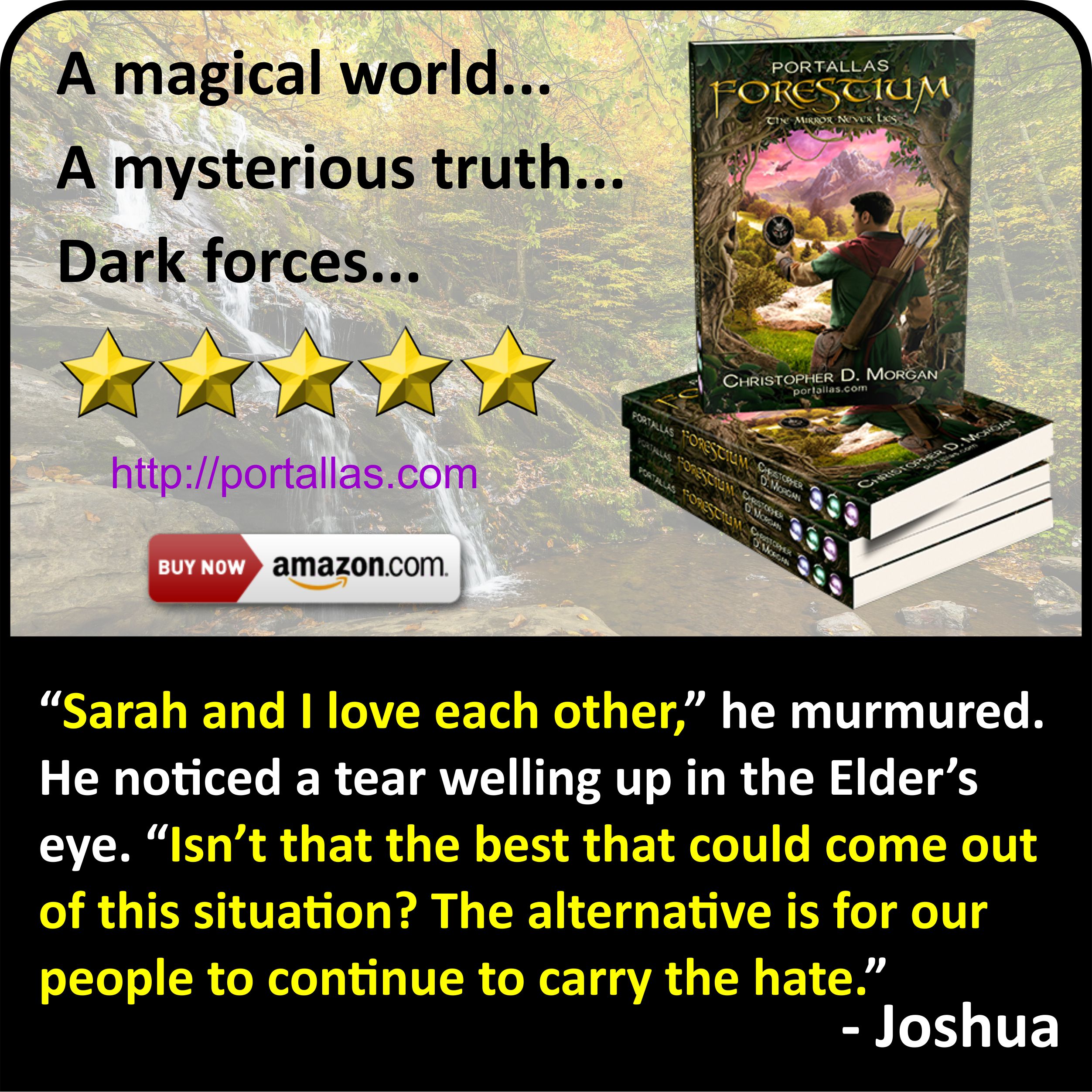
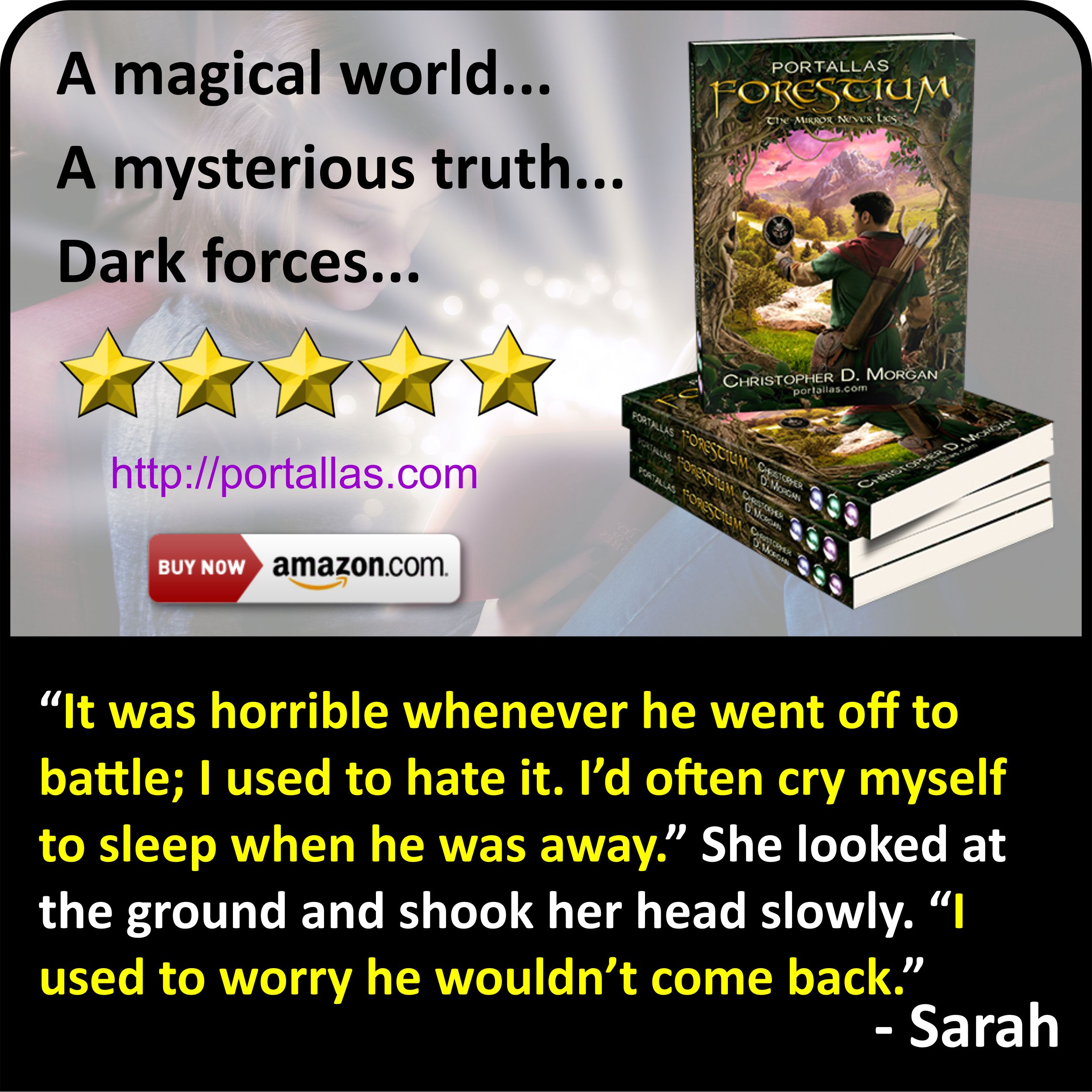

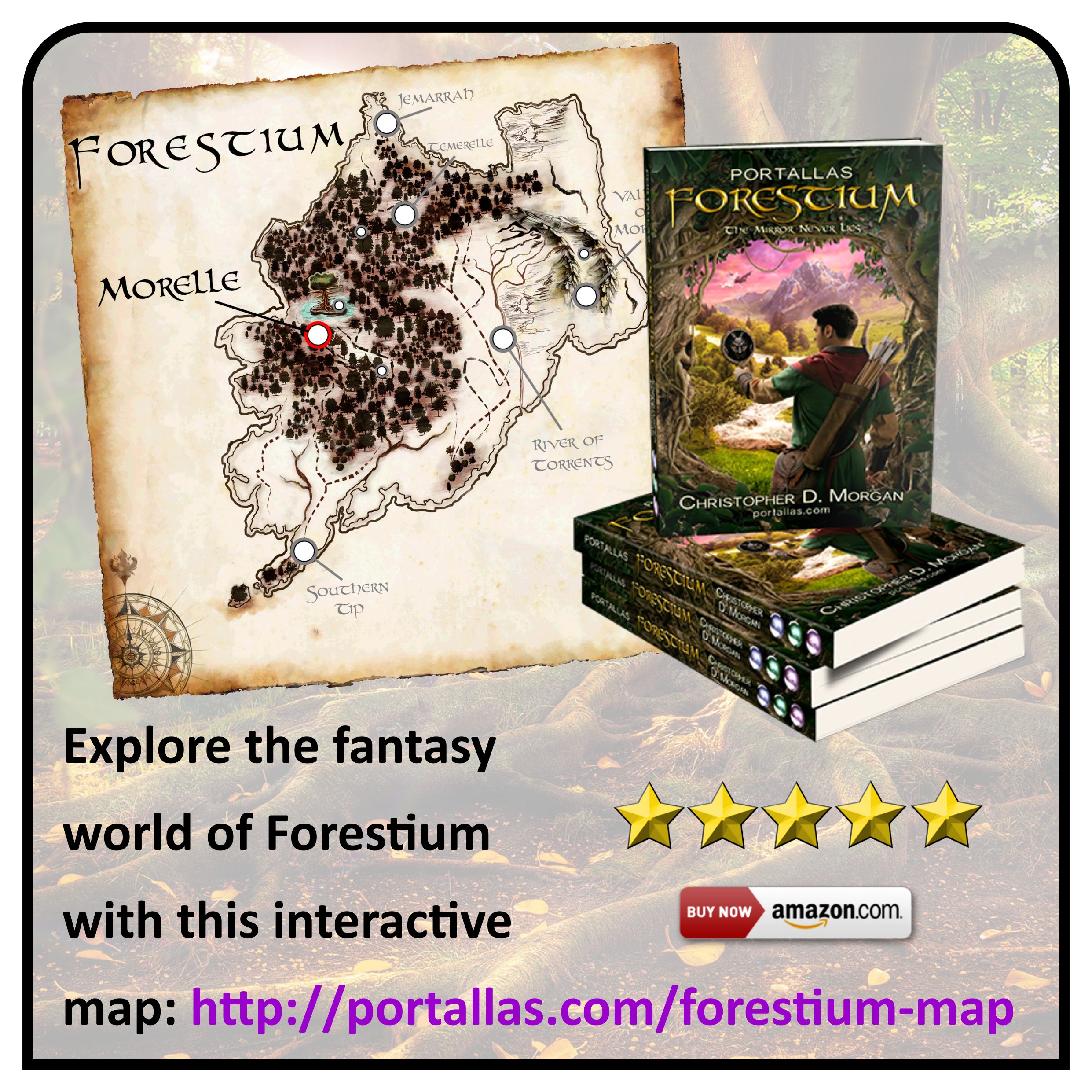
Over the course of a couple of weeks, I set about posting one of my dozen or so ad graphics (see all of them here) to the various Facebook groups. Every day I posted different ad graphics to maybe a couple of dozen or more groups. In addition to the ad graphic images themselves, I added various chunks of texts to the posts. These were review snippets and things like 'Thanks for adding me to this group, check out my book here...'. They were generally things telling people how wonderful I am and why they should immediately go out and buy my book.
I mixed it up by changing the combination of text and ad graphics. By doing this, I made sure that I never posted the exact same thing to the same group twice. I also made sure that I was not posting the same thing each time. I didn't want anyone that was a member of multiple groups to see the same thing from me multiple times.
The nice thing about going through this whole exercise is that I've learned a lot about what sort of graphics work the best. At least, I've picked up on those types of graphics that appeal to me. What appeals to others may differ, of course. Still it's been a great way to get new ideas.
Results
After doing all of this for a couple of weeks, I noticed something poignant. Namely, that I wasn't really seeing any results. In other words, I wasn't selling any more books. Why? How could I not get any sales from exposure to nearly three million Facebook users?
This puzzled me so I started to dig deeper. Fortunately, I'm driven, tenacious and have something of a bit of OCD about me. I started collecting all sorts of data to try to help me understand was was, or wasn't, happening. I systematically went back to each of the groups in turn and spent some time inspecting the timeline to see what was happening. What I found was extremely interesting.
Stats & analysis
Social Media can be a good thing but it works best when there's lots of what's called engagement. This essentially means other people interacting with your posts. It could be likes (or reactions now), shares or comments. All of these things collectively are referred to as engagement. As I was browsing through all these groups, I found that most of them had little to no engagement whatsoever. Hmm. After collating lots of data, I categorised each group according to its level of engagement. I created three basic categories:
| High | Lots of likes, reactions, shares and plenty of discussion threads for most of the posts. |
| Medium | Not a lot of activity but some. |
| Low | Barely any activity whatsoever - perhaps the odd like here or there but nothing more. |
After categorising 155 of the groups that I'm a member of, only 11 ended up in the HIGH category and just 6 ended up in the MEDIUM category. 138 groups showed all but no engagement at all. Even after scrolling through days and days worth of posts, I still found zero or very nearly zero activity in the vast number of groups. Why?
One thought that crossed my mind was that perhaps it was related to the number of group members. Some groups have as little as 300 members. On the other end of the scale, one group has a staggering 321,500+ members. Everything else in between is represented. The average number of group members across all the groups is just a little over 10,000.
I wondered whether the groups with the high member count might be seeing so many posts that it would be impractical for any appreciable engagement to be taking place. If even only a small percentage of those hundreds of thousands of group members were posting every day, the timeline might be flying past at such a blur that you'd never see anything. So I started to look a bit more closely at the correlation between engagement and membership numbers.
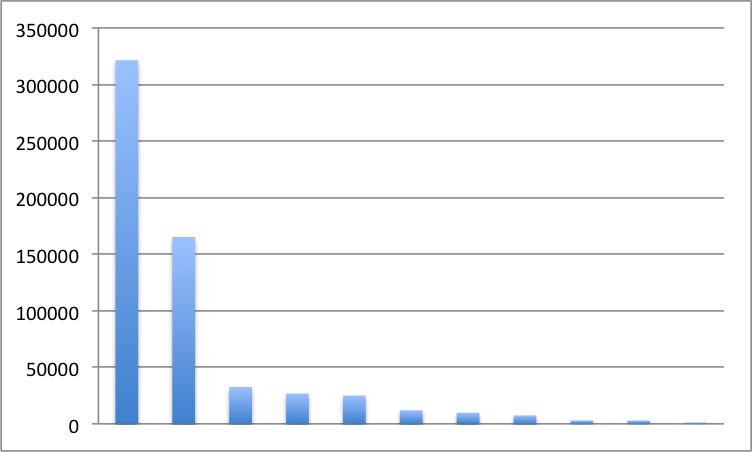
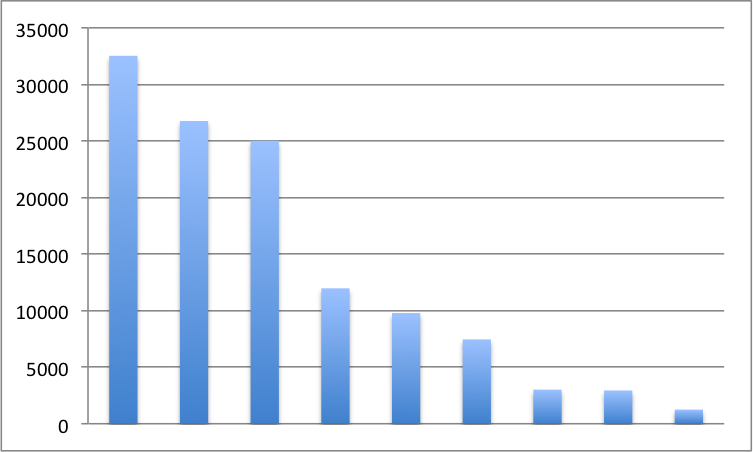
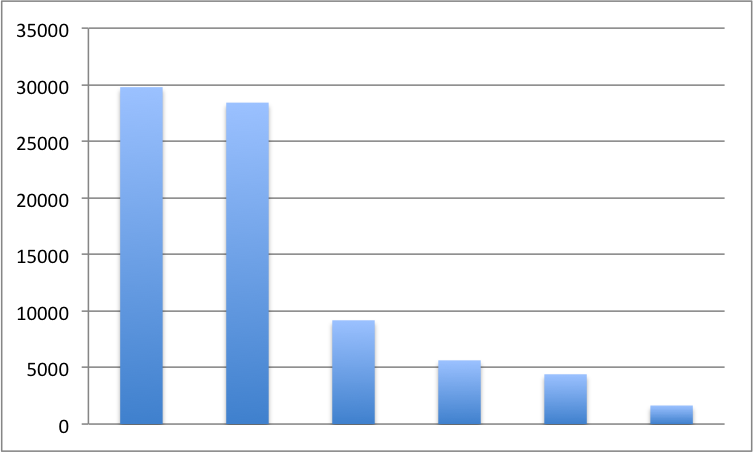
Groups with HIGH levels of engagement.
Groups with HIGH levels of engagement (excluding the two huge groups).
Groups with MEDIUM levels of engagement.
What these graphs show, in case you were wondering, is that large and small groups alike are in all engagement categories. In other words, the number of members in the group doesn't seem to affect what level of engagement that group will have - it's fairly evenly spread. Whatever the reason is for the engagement, or lack thereof, it must be something other than the number of members in the group.
Several other things became clear to me as I was perusing the timelines of dozens and dozens of groups. Firstly, I was clearly not alone in joining so many groups. A number of other regular names and faces kept popping up in many of the groups. After a while, I could recognise dozens of the same images that I saw in multiple groups. Clearly, lots of other authors are doing what I'm trying to do by posting about their books to lots of different groups.
Tactics
I don't begrudge anyone trying to gain an edge. It became clear, however, that there were various tactics at play by different people. Here are some that I noticed:
The same people are liking the same posts in multiple groups. Each time I saw a familiar post in a different group, it was very often liked by the same person. Sometimes this was the person that posted the ad but often it was a different person. In some cases, the same two people liked the same post in each different group. They even posted the exact same comment each time. This suggests either there is a particularly hardcore fan of a given book, or the book owner is mascarading to provide the illusion that others are liking their book.
In groups with LOW engagement, likes were sometimes responded to with a thank-you from the original poster. Perhaps this is a way for the poster to try to solicit further engagement. It almost never worked. These thank-you posts was almost never followed up on.
Some people are in the habit of trying to bump their book ad post by typing a single dot (.) I presume this is to bring that post back to the top of the feed. This may or may not be effective. You can change your Facebook settings to control what you see in your feed. Facebook also has algorithms that determine what you actually see.
A number of different tactics were being used to make their post stand out in the crowd. One in particular is the use of special character. Stars in various configurations (★, ★☆★☆★, ★★★★★, etc.) seem to be quite popular as does ASCII line art. Here are a few examples:
`*•.¸(`*•.¸(`*•.¸★¸.•*´)¸.•*´)¸.•*´
★☆★ PREORDER ★☆★
¸.•*´(¸.•*´(¸.•*´★`*•.¸)`*•.¸)`*•.¸
o()xxxx[{::::::::::::::::>
( ͡° ͜ʖ ͡°)
.`•.¸.•´ ★
¸.•´.•´¨) ¸.•¨)
(¸.•´(¸.•´ (¸.•¨¯`* ღ
★*´¨) FREE to KU
¸.•´¸.•*´¨) ¸.•*¨)*★*´¨)
¸.• Forestium: The Mirror Never Lies
╔═══════════════════╗
New York Times Best Selling Author
╚═══════════════════╝
~♡ⓛⓞⓥⓔ♡~
This is but a mere selection to illustrate the point. Some of them can really be quite inventive and artistic. There are even web-sites devoted to them, where you can explore different variations to copy for later pasting into a post. Here are a couple that I stumbled into:
It's worth noting that as with any kind of marketing, something that becomes popular can loose its effectiveness. Let's say you're standing in a room full of people and you want your message to get to another person. You could always just shout to make sure you're heard above everyone else. If you're the only person shouting, that might work. If the others see this working, they will try the same thing. Before long everyone else is shouting, trying to get their messages heard. What you end up with is a cacophony and nobody is effectively heard.
I also noticed that every now and then, a rogue post that's totally unrelated to the purpose of the group was posted. Interestingly, these weren't challenged, suggesting very little, if any, moderation is taking place in many of these groups.
Many groups had posts were receiving a single (or a small number of) likes. When I checked this further, I found that it was typically a small number of people, or just a single person, persistently liking all posts.
Home grown advantage
Most groups have a pinned post which remains on permanent display. In groups with LOW engagement, this is very often the most engaged post. This makes sense as it's always there, always visible and has been there for some time. These pinned posts typically contain one of the following:
- Some information about the group, it's purpose and who it is intended for.
- Instructions to the group members about what they can or cannot do (group rules).
- An ad for a book - presumably the group owner or admin.
Interestingly, it's very often #3, which, if you're the group owner, effectively means a LOT of free advertising. Similarly, the group image at the very top of the page is very useful. It's often used as a vehicle to promote an individual's book. This suggests that even if there's no engagement on the group's posts and you have no intention to spend any time moderating the group, there's a definite benefit to starting one of these groups. It's a ready way to expose whatever information you wish to a potentially large audience
Caveats & limitations
Before I come to my conclusions, I have to acknowledge the following caveats and limitations:
- Although we're talking about a relatively large number of groups, it's still only a sub-set of Facebook activity as a whole. The data that I have access to is limited, so any conclusions need to be considered in this light.
- I have only looked at these groups over a relatively short period of time - over the course of a few weeks. I am assuming that the level of group engagement during this period of time is representative of the rest of the year, which may not be the case.
- I have NOT captured detailed stats about how frequently the groups are being posted to. Some are posted to many times an hour and some only a few times a day and I have NOT correlated this against group engagement.
- I've no way of knowing how many people actually see each post. Even if there is little to no engagement, that doesn't mean the posts aren't being seen by people. Facebook doesn't show you every post from every group you are a member of in your feed. However, the more you engage in a given group, the more Facebook will display content from it in your feed.
- Level of engagement in a post doesn't necessarily correlate with the quality of the author or book. Discussions may fire up on a given book post that have nothing to do with the book, which I saw happen several times in passing.
- I did NOT track the time of day for the posts that were being engaged in. As such, I cannot correlate time of day with engagement. It may be that engagement happens during a particular time of day for a given group.
- I've assumed that HIGH levels of engagement are for the most part genuine and not contrived.
- I have not tracked whether HIGH levels of engagement are specific to book ads.
- I am a new author on the scene and not a well-known name. Add to this the fact that I am but one in a large and ever growing number of similar authors all trying to swim in the same vast ocean.
Conclusions
Despite my intense group posting activity, 593 posts over the course of a few weeks, I've seen little to no appreciable effect in sales or engagement. Notwithstanding all of the above caveats and limitations, it's hard to escape the conclusion. Posting book ads to Facebook groups it not terribly effective or a particularly good use of time. At least it hasn't been for me - your mileage may vary.
Does this mean I'll stop posting to Facebook groups? Well, for the majority of LOW engagement groups, I think it does. Although a useful exercise, my ROI against time invested has been very poor. Having said this, there may be some intrinsic benefit from an SEO point of view. As such, I may not discontinue posting altogether. For the HIGH engagement groups, I will look more closely at posting to those. I will study them a bit more closely before doing so. I want to try to find out when is the best time to post, what the most engaged posts are, etc.
Do you have any other conclusions or experience with posting to Facebook groups? If so, do let me know in the comments below.

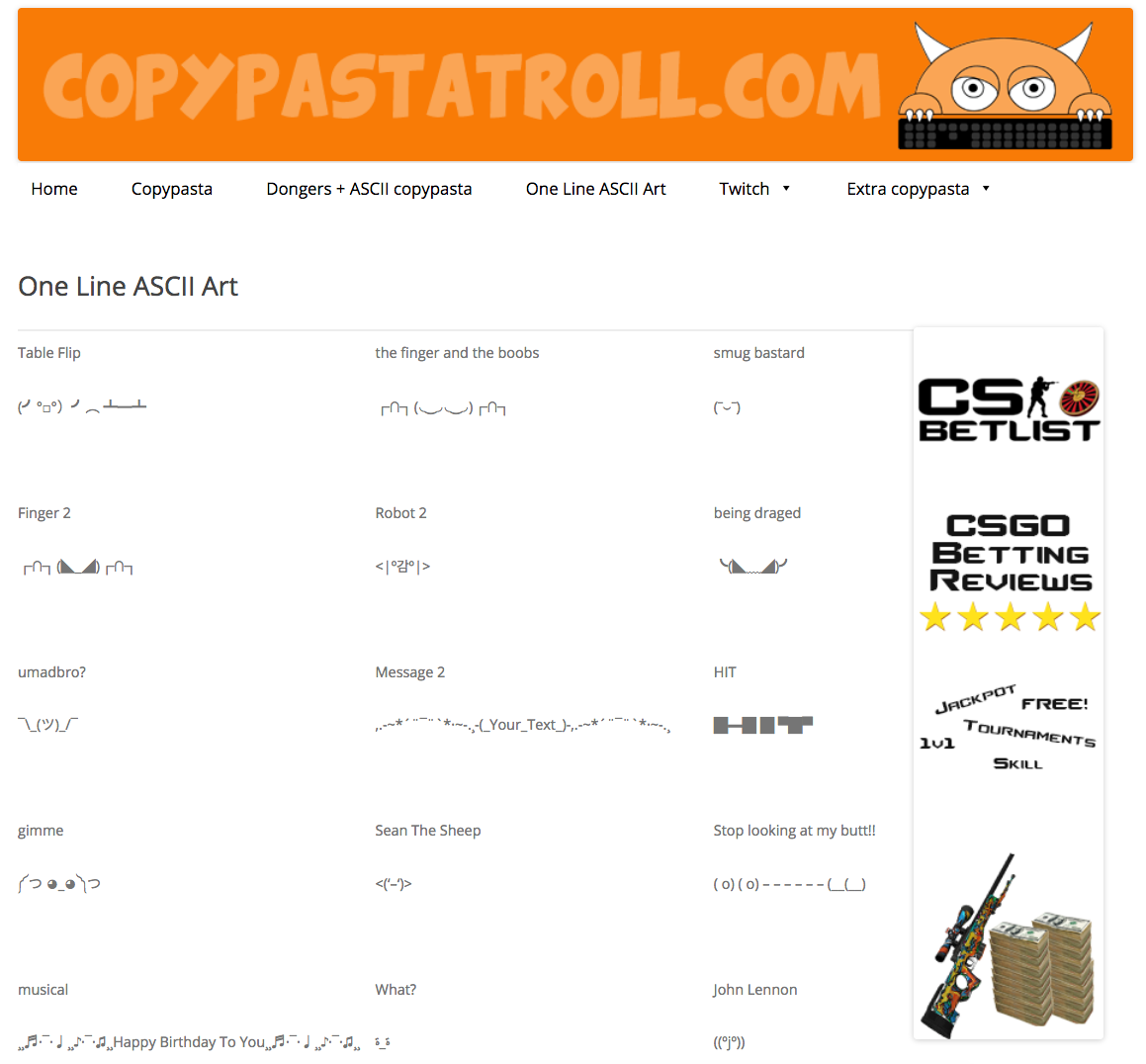
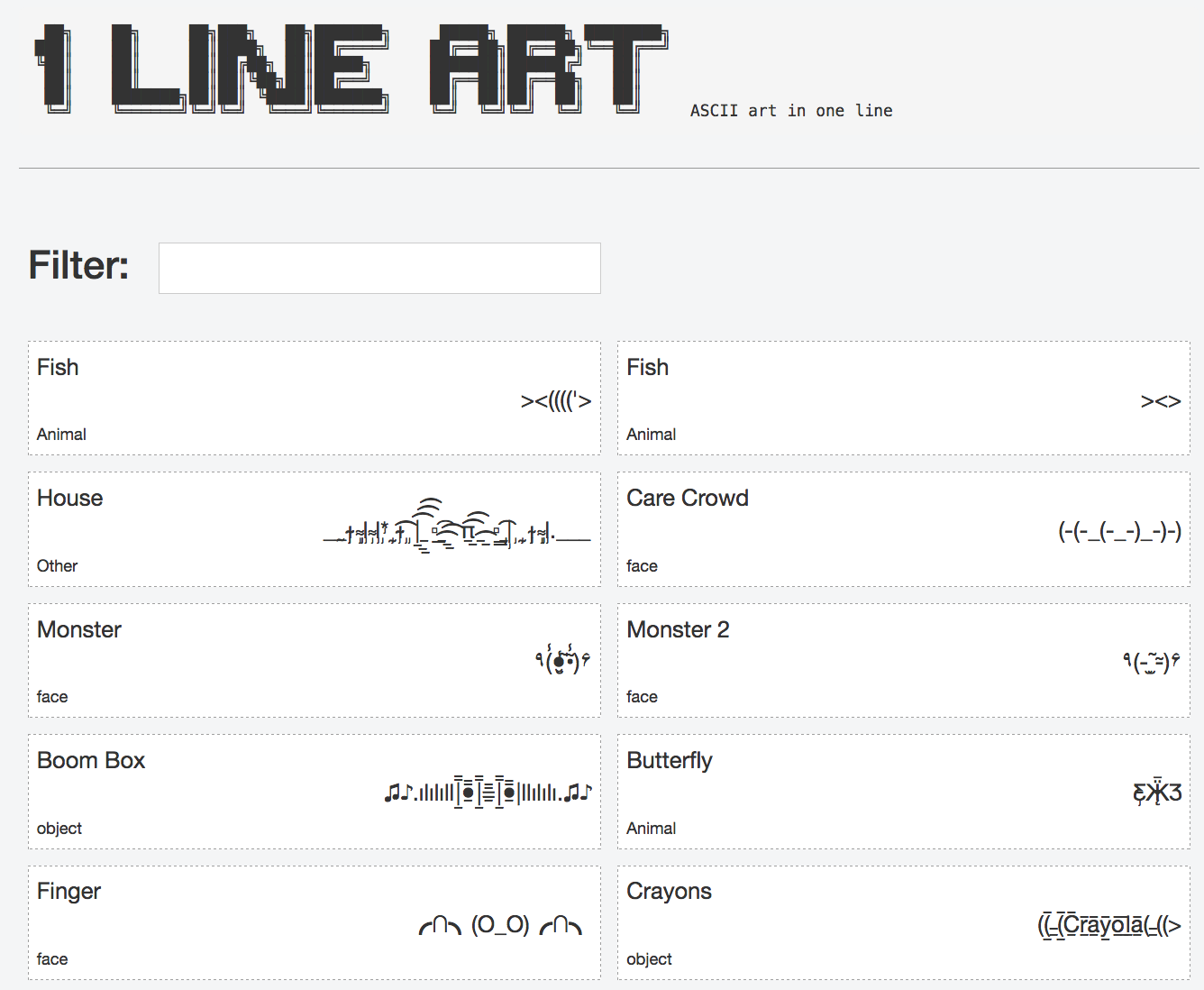
4 Comments